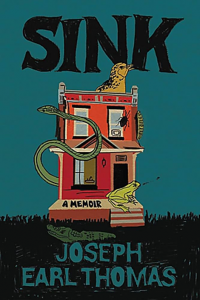

Review by Ashley Swallow
Navigating life in Philadelphia never came easy for Joey, the protagonist of Sink by Joseph Earl Thomas. Being a person of color, living in poverty, and being Keisha’s son came with endless expectations and rules rooted in violence, threats, and a never-ending tough persona. Since Keisha’s addictions came first to Joey, he became all too used to fending for himself and growing up without his mom around. As a result, the young child was often under the care of his Popop and Ganny.
Becoming the cornerstones of the imaginative, fantastical mindset that would carry and protect Joey, Pets, Pets, Pets located on Frankford Ave, Spike his garden snake, Joey’s complex relationship with Tia, and gaming were some of the small escapes that the young boy found reprieve in. Throughout Thomas’ memoir, he touches on a desire to be cared for and led, and as the book and narrator move forward, readers learn and watch Thomas’ difficult journey to become the thing he needed.
At odds with the culture he was born into, much of Thomas’ memoir reads as stories of survival. Hope, heartbreak, and home are some of the core themes that bounded Joey’s story of retaliating redemption. His Popop waited for him to defend his little sister with violence and slurs, keeping watch in class for roaches running out of his backpack, cutting even more grass to buy back his Sega that Joey’s Ganny sold to the pawn shop: Optimism was a trait that Joey seemingly despised. Rising above to meet himself, Sink shared Joey’s persevering perspective through it all.
One excerpt of the book illustrated both Joey’s perspective and the issues that persistently plagued him. Thomas wrote, “How do you add and subtract? And for what? What is deodorant? And toothpaste? Why the stupid teachers think I have time to read the stupid books? Why does everybody wanna know about my winkey or doin it or not and with who and how and when and at what time of the day? And why do they care about God and don’t care about no people? And where is God?” Despite this all, Joey was constantly told he was spoiled.
Thomas’ choice to narrate the majority of the memoir from the eyes, ears, and mouth of Joey is a testimony to the author’s ability to deliver the stories of his childhood both unscathed and untouched. The third person narration adds to the book’s authenticity and relevance. It is as if Joey has returned from the past to tell his truth. In the best way possible, the authentic prose and perspective comes across free of consideration, reflection, logic, and time. Sink is a narrative of, in Thomas’ words, when, “Possibility exceeds reality.”
Author:
Joseph Earl Thomas is a writer from Frankford whose work has appeared or is forthcoming in VQR, N+1, Gulf Coast, The Offing, and The Kenyon Review. He has an MFA in prose from The University of Notre Dame and is a doctoral candidate in English at the University of Pennsylvania. An excerpt of his memoir, Sink, won the 2020 Chautauqua Janus Prize and he has received fellowships from Fulbright, VONA, Tin House, Kimbilio, & Breadloaf, though he is now the Anisfield-Wolf Fellow at the CSU Poetry Center. He’s writing the novel God Bless You, Otis Spunkmeyer, and a collection of stories: Leviathan Beach, among other oddities. He is also an associate faculty member at The Brooklyn Institute for Social Research, as well as Director of Programs at Blue Stoop, a literary hub for Philly writers.
Reviewer:
Ashley Swallow is a freelance writer from Philadelphia. In addition to being a contributing writer for Showbiz Cheat Sheet, Accept This Rose, and Sportscasting, she is a local standup comedian. Ashley earned her bachelor’s degree in secondary education English and communications from Pennsylvania State University.